Sary Chelek -> Osh – Indispositions, Politics and a Fairground
15. – 19. July 2023
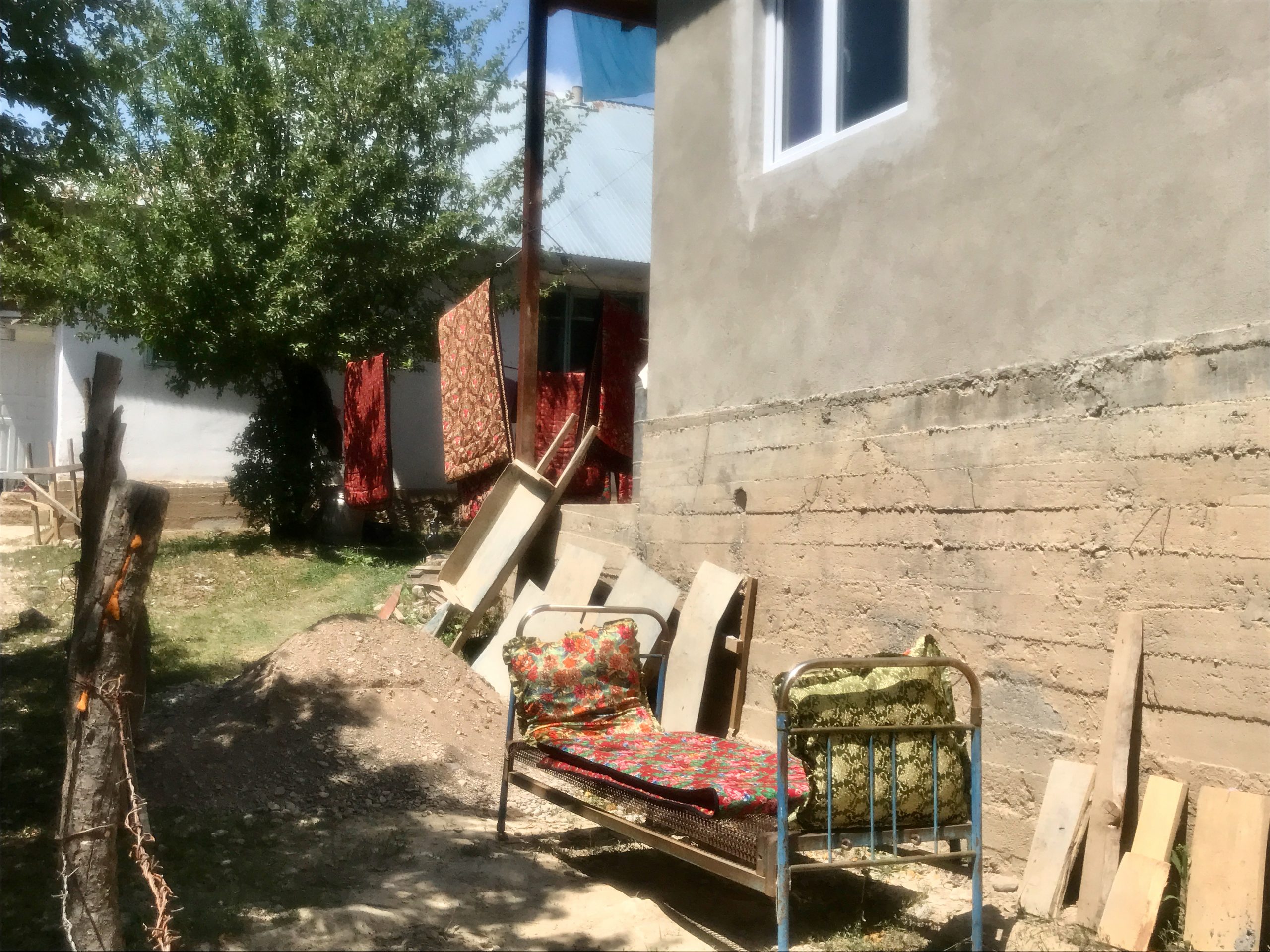
I had extended a day in Arkit because I was feeling a bit limp and was enjoying the pleasant evening air and all. I didn’t do much that day, just walked around a bit:
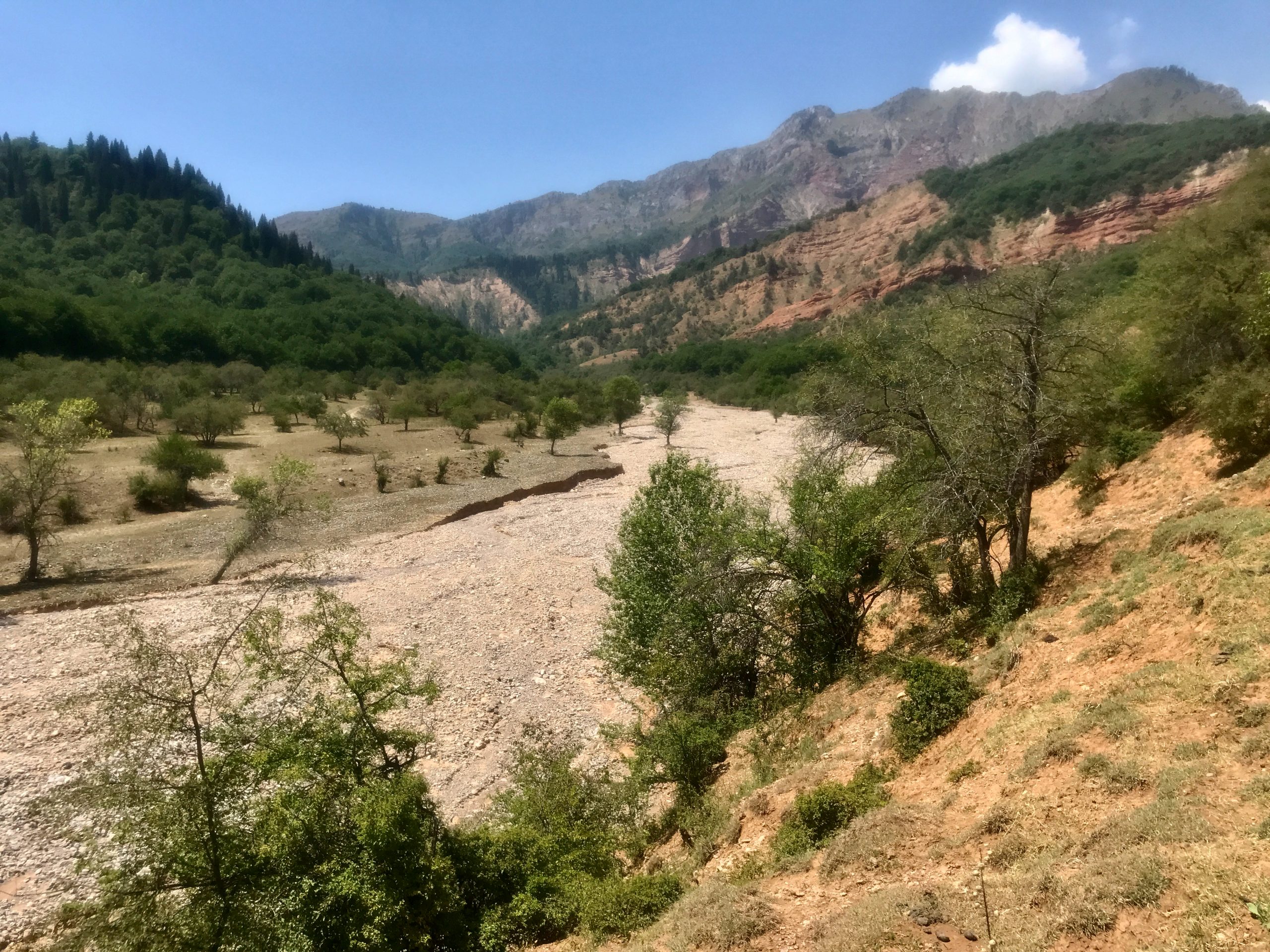 1
1
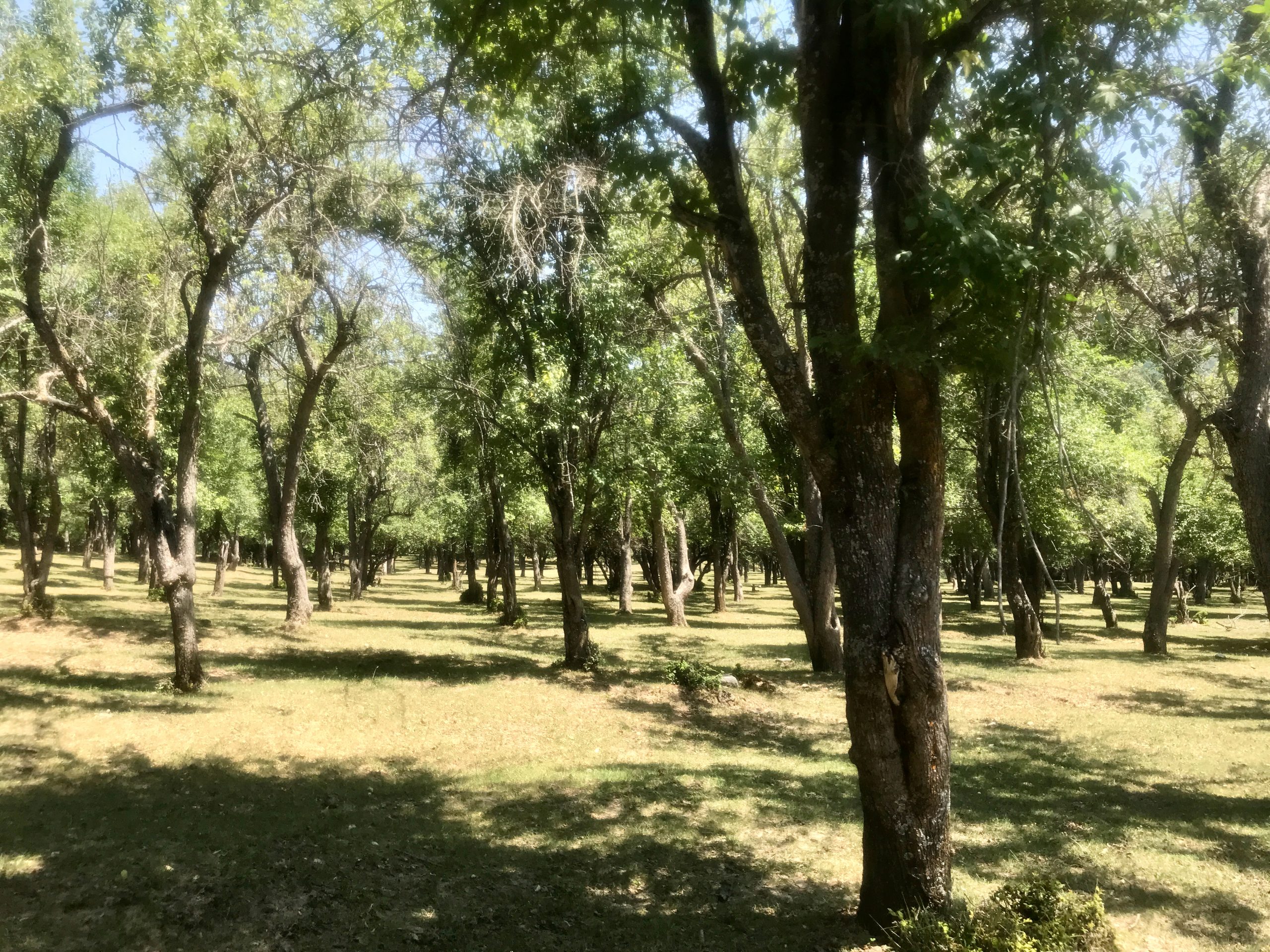 2
2
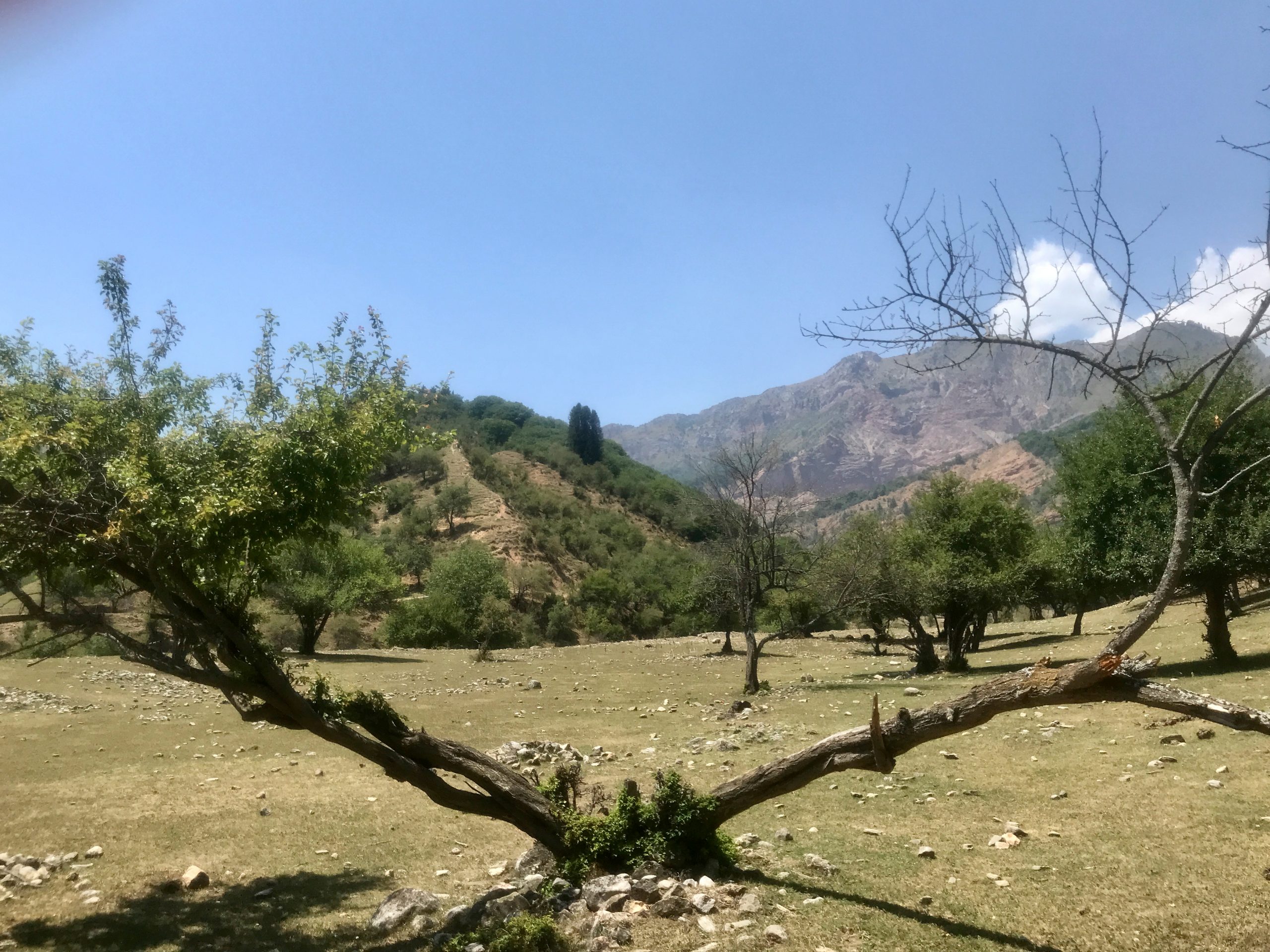 3
3
I had a headache the night before, that evening too, and when I woke up in the morning, I also had a pain in my legs. Nevertheless, I got on the Marshrutka, which would take me 6-7 hours further south to Osh, the second biggest city in Kyrgyzstan. The journey dragged on and I felt worse and worse. I felt a bit nauseous, my legs ached and I was a bit feverish. I also felt very alone and far away. 2 hours before arrival we made a long stop because something had to be repaired on the Marshrutka. It was hot and I felt miserable and waited unhappily. Finally we were able to get back on the bus. A woman sat next to me and looked at me worriedly. She wondered if I wasn’t feeling well. No – and suddenly I started to cry. She took my pulse: too high. She talked to the people. She stroked and massaged my hands and face/head. Ah, probably a headache too. I had to drink. She rummaged in her bag and found bread. And something to eat. Then someone came back with a tablet: 1/3 I got immediately, 2/3 packed for later. The bus started. She kept pressing me and taking my pulse. It seemed to be going down.
I had to cry again. So much unexpected love! And so many pleasant touches! But she told me to stop, it would only make my head hurt more! I smiled. She pressed and continued. And I felt better and better. She didn’t make it go away, but she stabilised me more. And made me feel happy: why was she there just at that moment? From the great travel misfortune to the greatest travel happiness. She spoke no English, I spoke no Russian/Kyrgyz and the translation app on my mobile didn’t work either. Nevertheless, I think I found out that she was a retired doctor (orthopaedics?) and 1 year younger than me. When she grabbed my belly, which also hurt, I made a comment about it being flabby. She laughed and said she also had a flabby belly. Then she showed me pictures: her husband had the biggest flabby belly. And on youtube there were films of her children arm wrestling, obviously successful. But I couldn’t watch much, then I felt nausea again. She kept patting and squeezing me and taking my pulse and was satisfied. Maybe some more bread? And here, a toffee! That tastes good? And woosh, I had 10 of them in my backpack.
So the time passed quite quickly and we were in Osh. She got off and I got off at the end. Or rather, I stumbled into the 36°C heat. But at least I was strong enough to bargain with the taxi driver. A clean, large, cheap room, a pleasant air-conditioning system, a bed – that’s all I needed now. My self-diagnosis: disturbances in the vegetative nervous system triggered by certain elements of a private nature, which I don’t want to go into here. My life has been quite turbulent and not always easy so far this year – and that is probably making itself felt now. But that’s the way it is – even when travelling, you always take yourself along as a whole person with all the trimmings and don’t split things off just because you’re somewhere else.
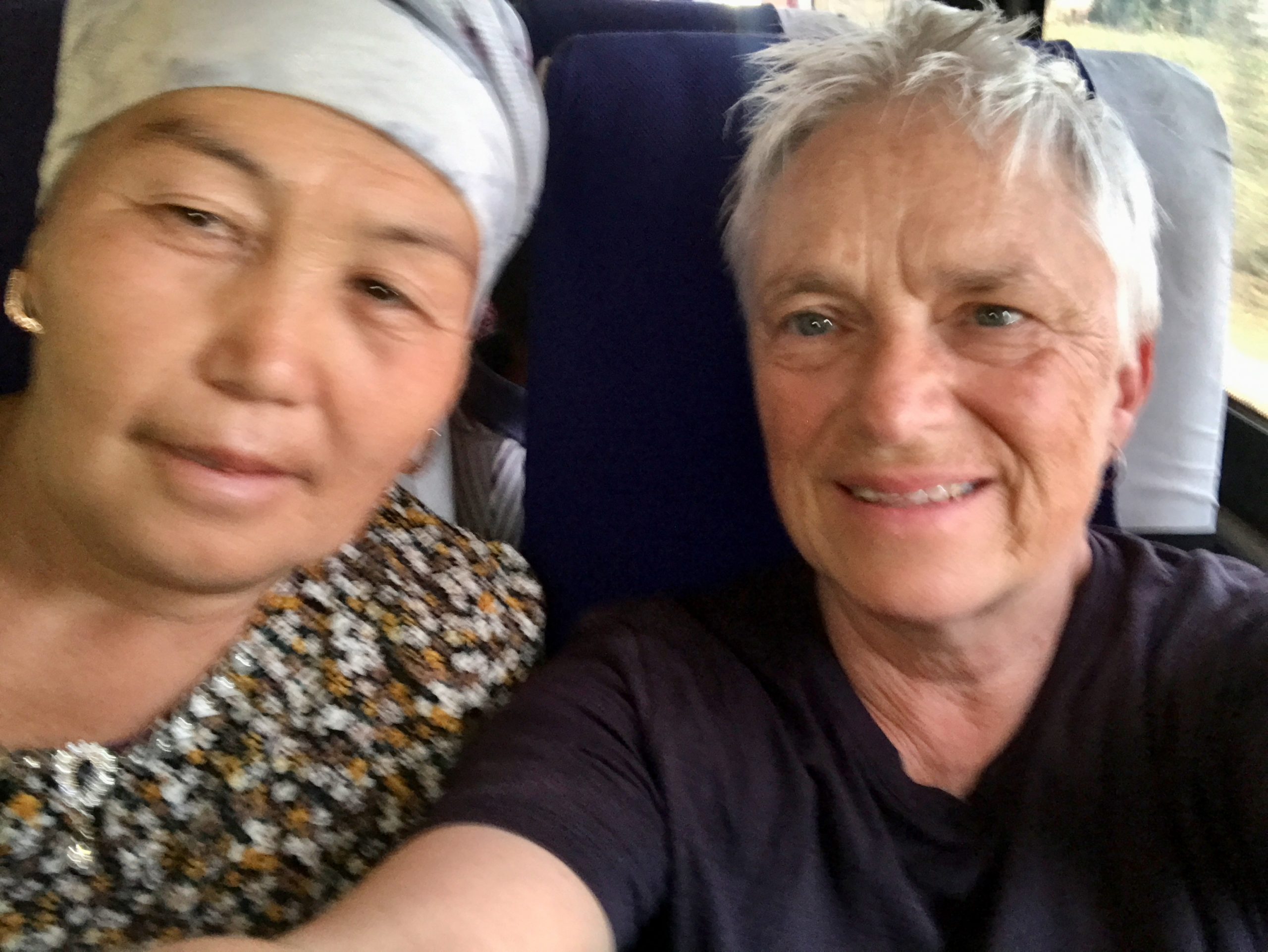 Hach!
Hach!
Osh has about 350,000 people and is very close to the border with Uzbekistan. A lot of them live here, as well as Kyrgyz, Russians and others, so it’s quite mixed on the streets. In this part, the map with Kyrgyzstan, Uzbekistan and Tajikistan looks quite tattered and scrambled. Borders were drawn under Russian rule in the 1920s and maintained after the break-up of the Soviet Republic. However, 400 km of the 970 km borderline between Tajikistan and Kyrgyzstan is disputed. Both countries take borders from different years. On the one hand, there are these official borders, on the other hand, the people living there have usually come to an agreement among themselves. It is mainly about grazing areas and water/access. Nevertheless, the governments with their armies are sometimes involved and do not care about existing unofficial agreements. You can read a bit in Wikipedia. Much better is this Podcast – everything very well explained (but unfortunately german only)! In any case, the last very serious border disputes with fatalities happened less than a year ago.
Travellers in Osh tend not to notice any of this. But what you do notice is that the Silk Road once ran along here and Osh was important.
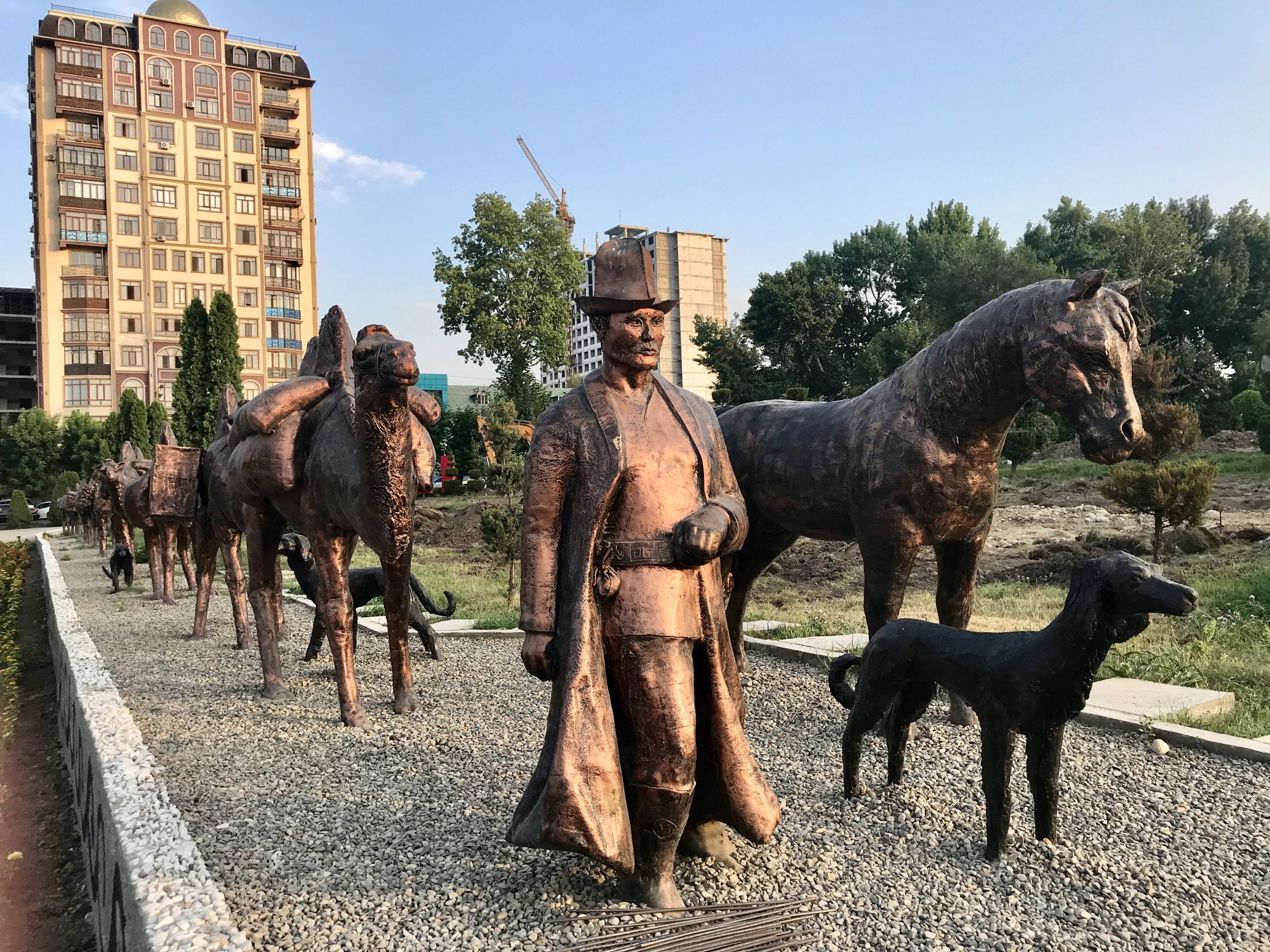 Statues
Statues
The city, like all the others, is rather Soviet-unbeautiful, but also a bit peculiar. However, I didn’t see much. Because of the heat, I don’t go out until 17:00 at the earliest. And not much anyway, because I’m taking it slowly.
But then I started walking and took a few photos of what caught my eye.
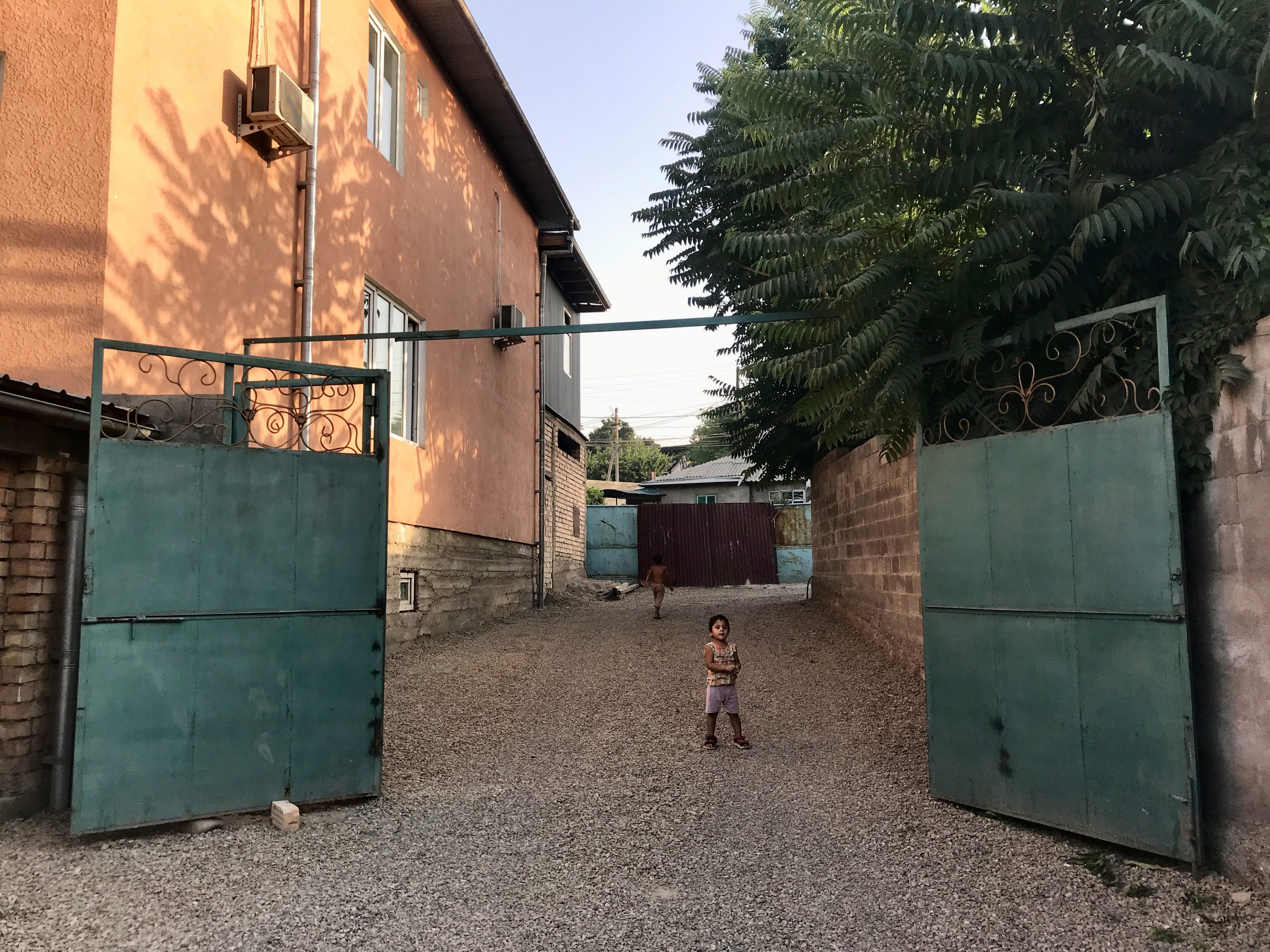 neighbourhood
neighbourhood
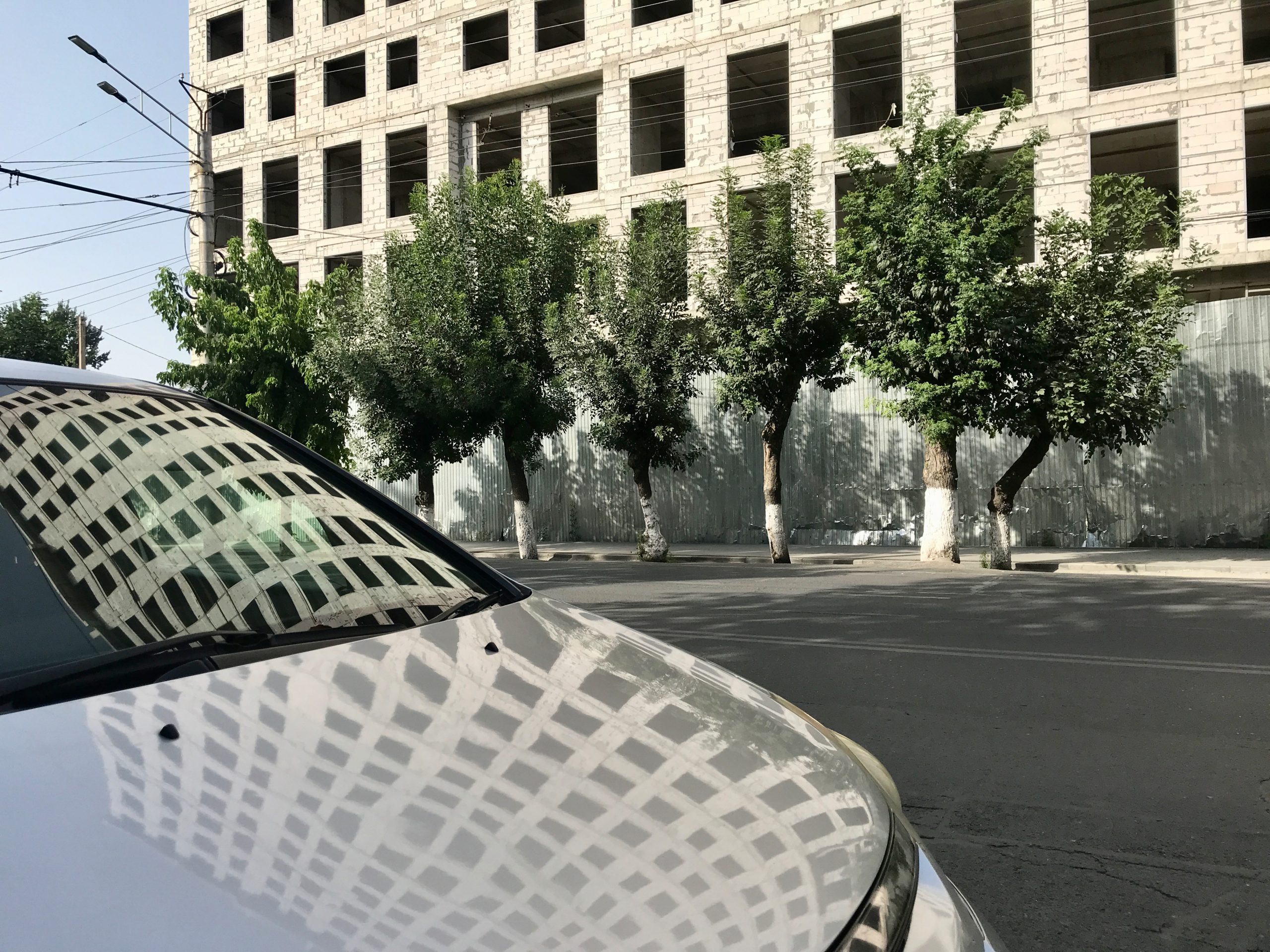 car patterns
car patterns
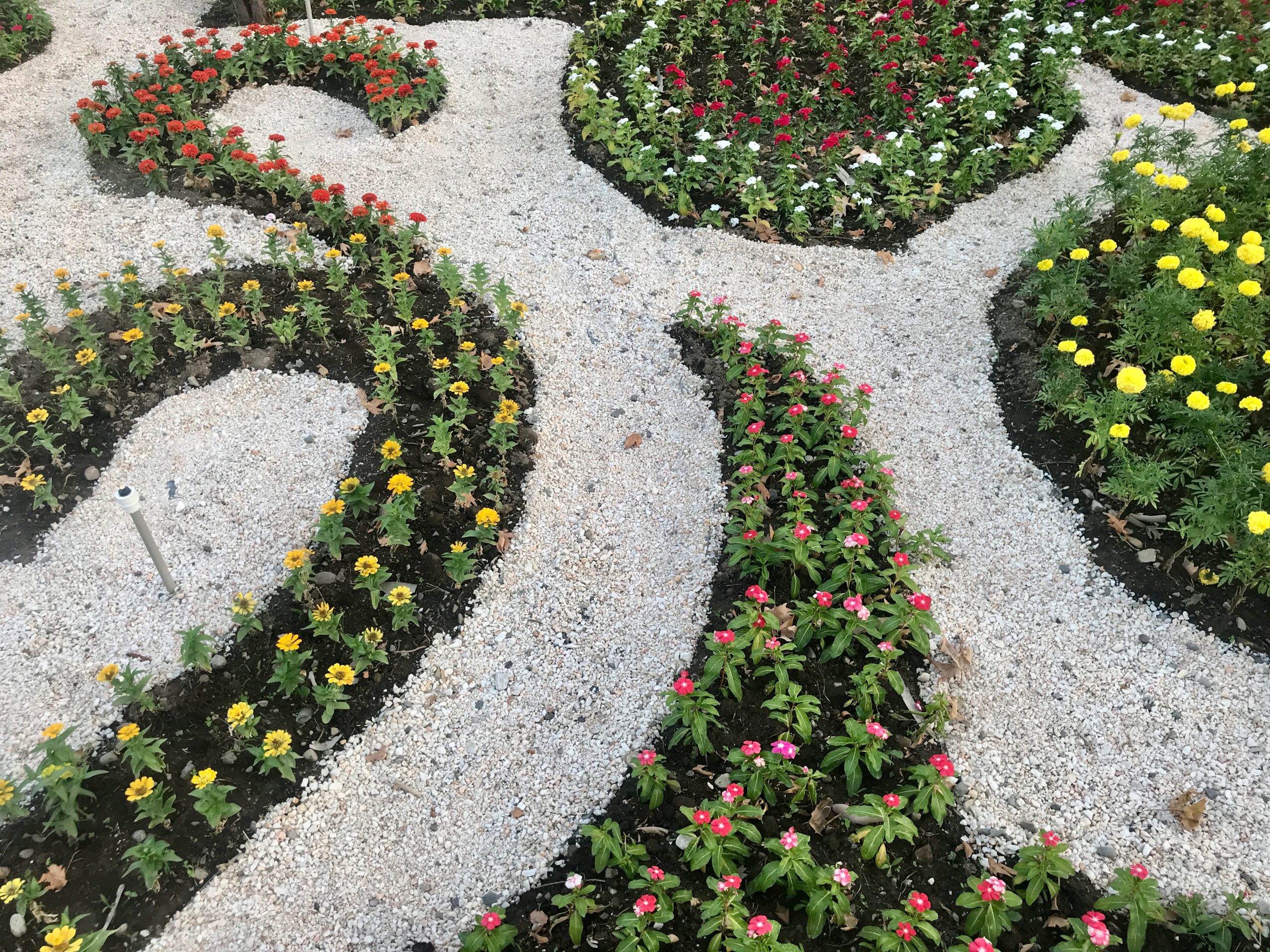 flowerbed patterns
flowerbed patterns
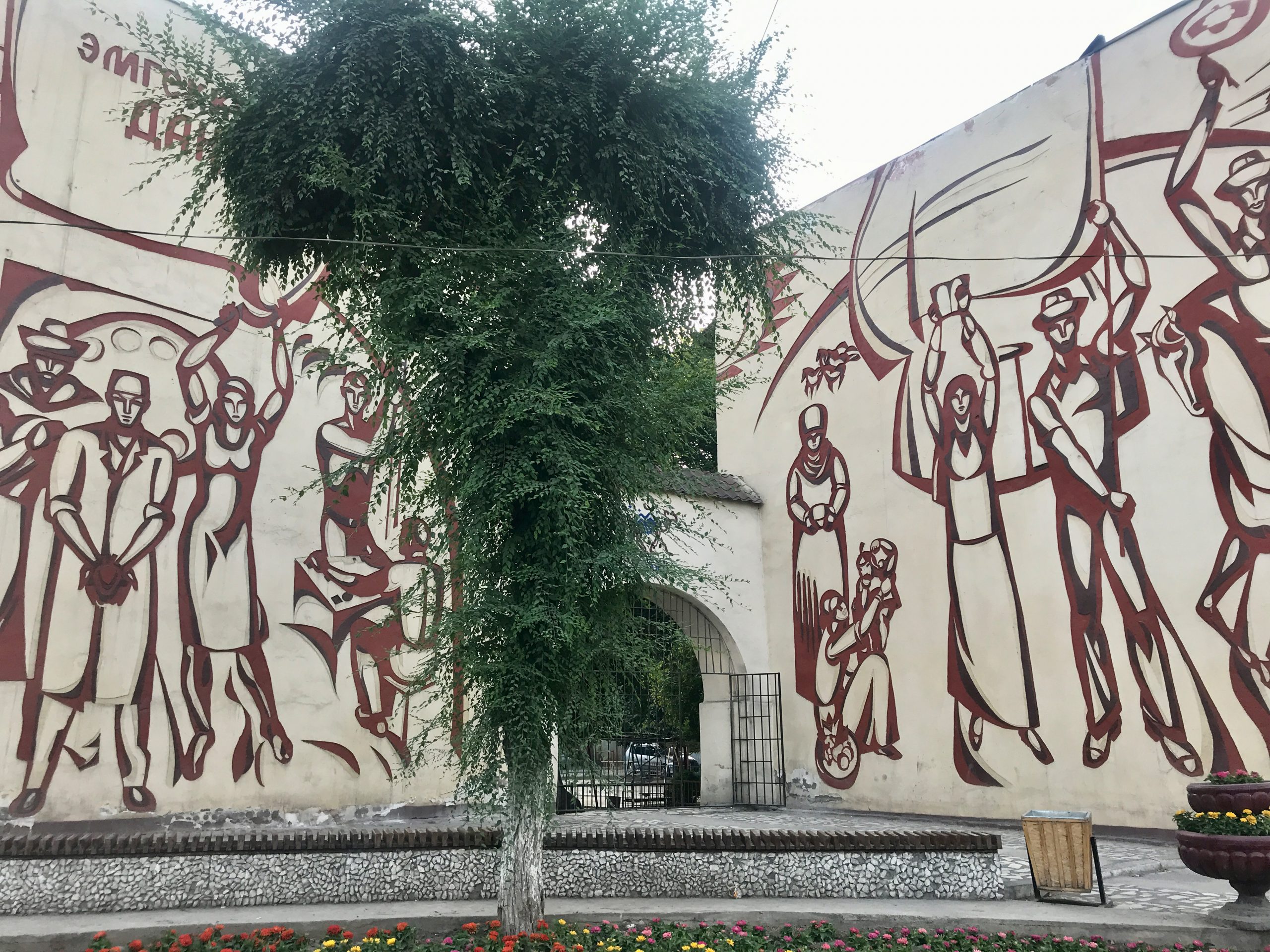 big wall painting
big wall painting
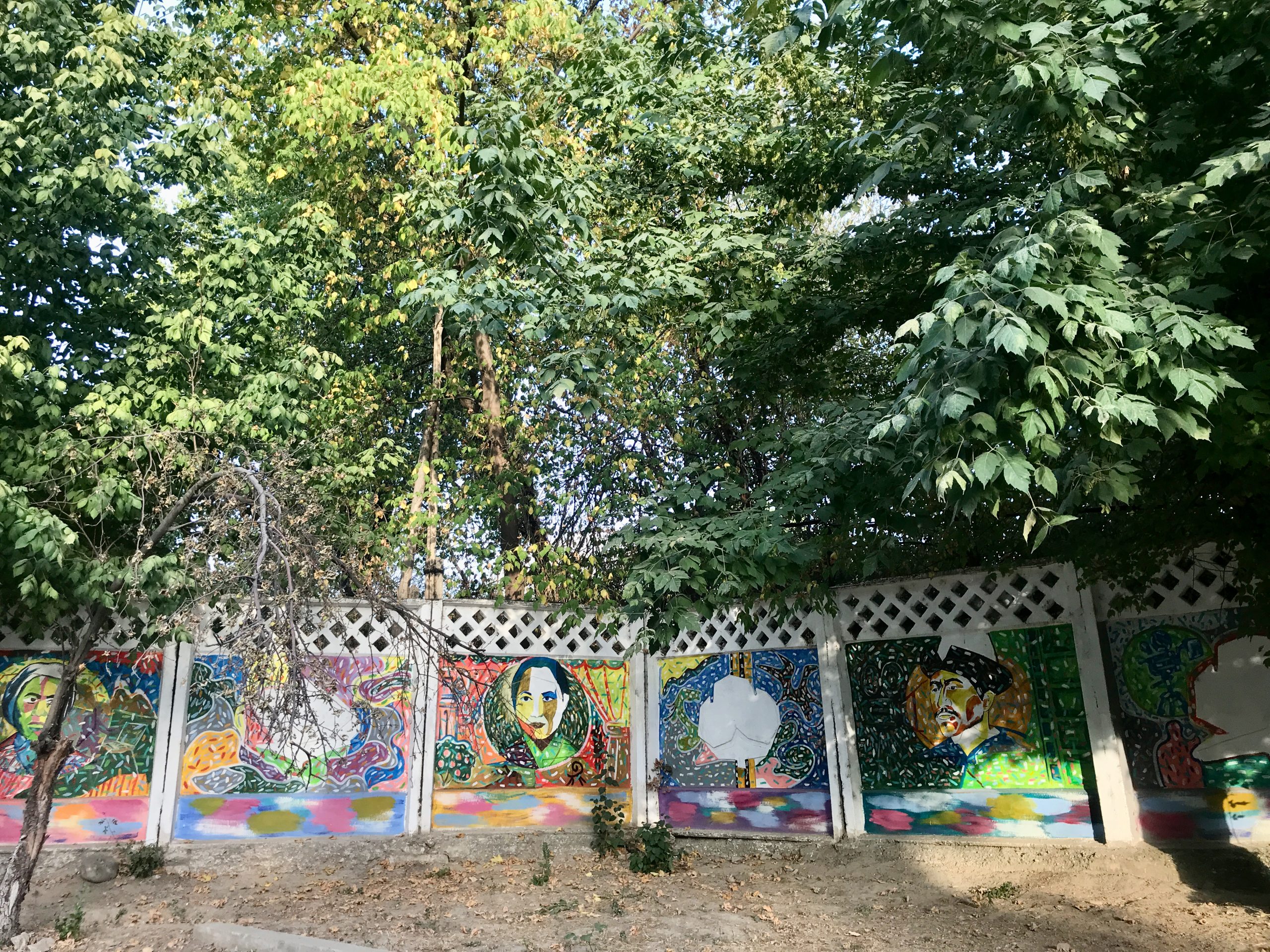 smaller wall paintings
smaller wall paintings
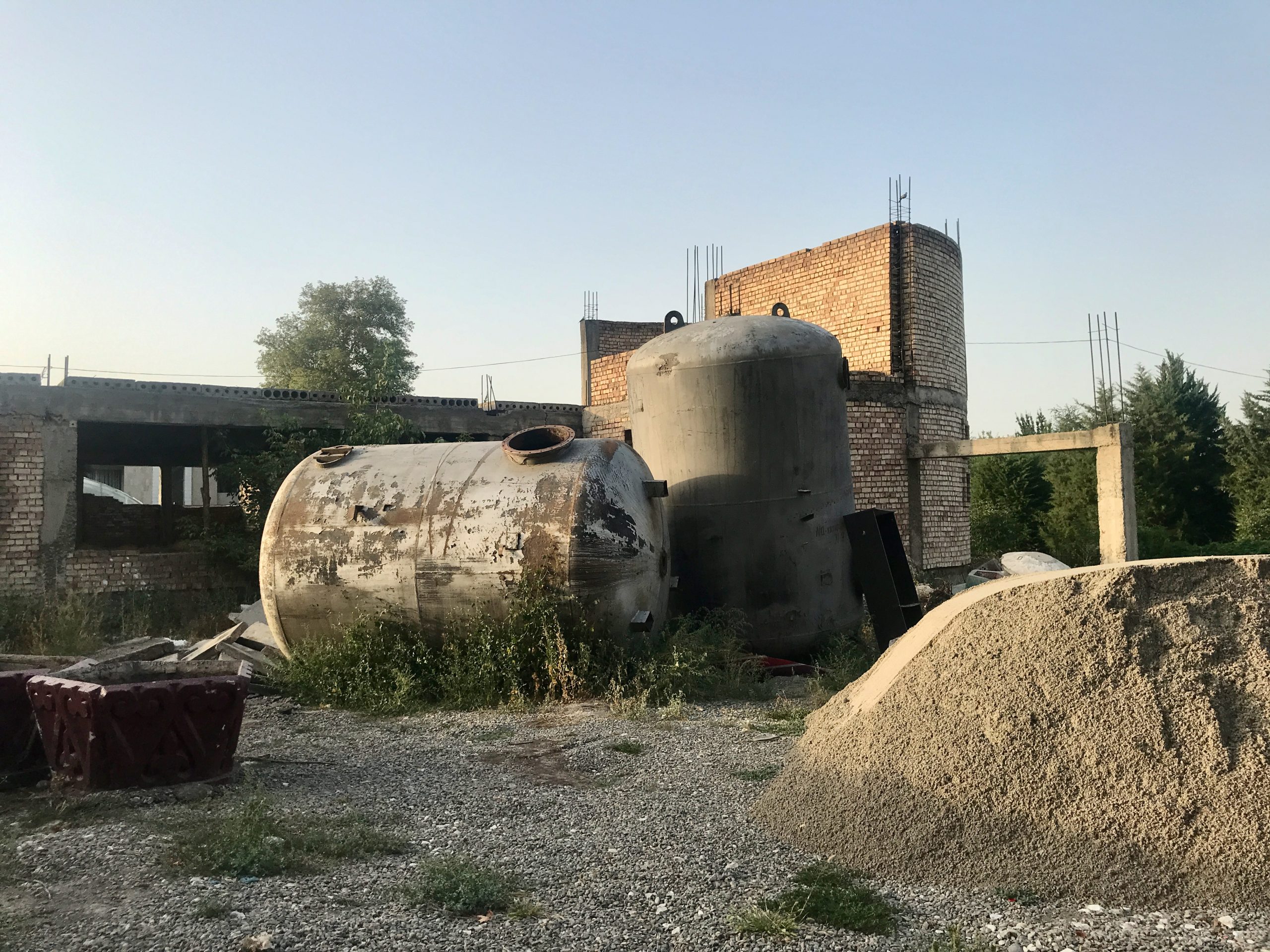 things, standing around
things, standing around
I want to say a few words about politics here. Kyrgyzstan was long considered the only democratic -stan country of the ex-Soviet Union, but this is crumbling more and more. Through constitutional changes, President Dzhaparov is accumulating more and more power. On the democracy index, Kyrgyzstan now has the designation “authoritarian regime”. In terms of status of freedom, freedom of the press and corruption, Kyrgyzstan is very close to the bottom.
I am still in baby shoes as far as my knowledge of post-Soviet regions and their development is concerned. And unfortunately, I have difficulties understanding all these connections of politics, economy, power and finances anyway. But I’m trying, sometimes I get a glimpse of what’s going on, and then I’m confronted with big puzzles again. What I didn’t know and what is currently bothering me (among other things) is why and how the current post-Soviet territories were actually annexed by Russia at the time. And why others were not. The annexations happened at times when – as I read – there was no real national consciousness. Neither that one belonged not only to a clan, a place, a region, but that one would form a nation with others and that one could strive to unite this nation in a (national) state. These ways of thinking were only formed in the 20th century and by then they were already part of the Soviet Union. And when they were released from the Soviet Union after perhaps 70 years on average and became independent, it was not so easy to cope.
Borders had been drawn and a completely different form of society and organisation of life had been established on the basis of communism. How could one find one’s own way, what was there to build on? Most states had to struggle with the fact that the administrative apparatus caused massive costs, but that they had much less income after the “Russian economy” disappeared. The economy had collapsed because the trade lines had disappeared. After this long period of time, people didn’t know how to stand on their own two feet and build new networks. Some already knew something and took advantage of it with the consequences of the emergence of oligarchs and corruption. Moreover, it was difficult to get away from Russia, which at least offered certain already existing economic channels. How each of these states dealt with this is then very interesting. And then there are all the other foreign countries – whether the West, China or others – that got involved.
This mental excursion has perhaps long been basic knowledge for many readers – I have to acquire it anew and it helps to try to reproduce it in my own words. And that ends up in this blog…..
Kyrgyzstan has found it difficult to break away from Russia, or has not done so to date. Many trade routes continue to exist or have formed. But it is not only goods but also people that keep these relations alive. Around 25% of the GDP comes from remittances from Kyrgyz guest workers, most of whom stay in Russia. They must continue to strive for good relations. Already in Georgia, I saw what role a post-Soviet state can play in circumventing Western sanctions regarding the Ukraine war in relation to Russia. Kyrgyzstan ist – as told by Washington Post – heavily involved especially in trading with parts for war weapons. Phew, it’s all tangled up! And if I now throw in that at least Osh plays some role in the drug trafficking business…..
Time to let it rest and visit a fairground! It’s a permanent fixture in Osh and quite big. I spent an evening there, here are my pictures:
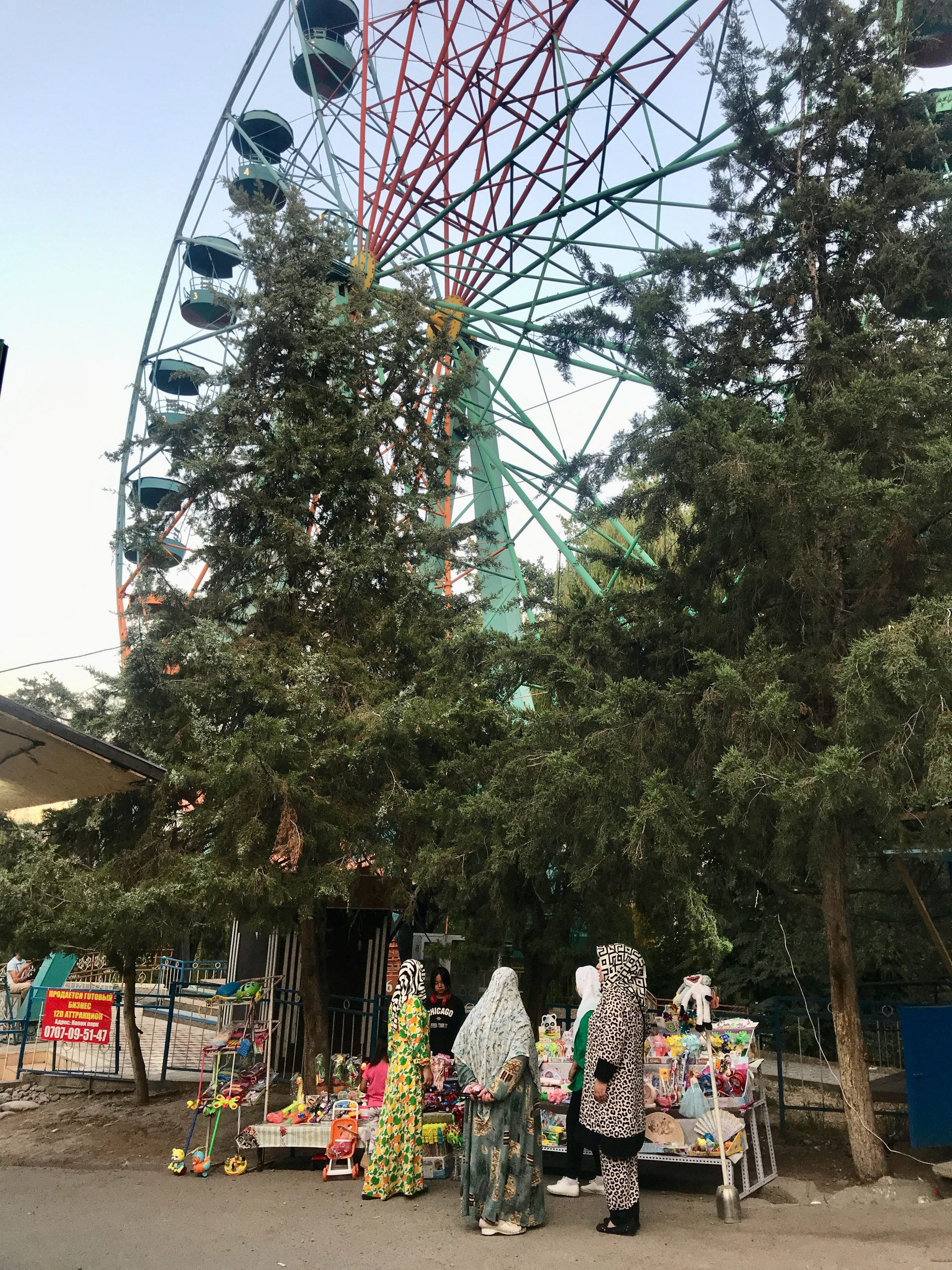 1
1
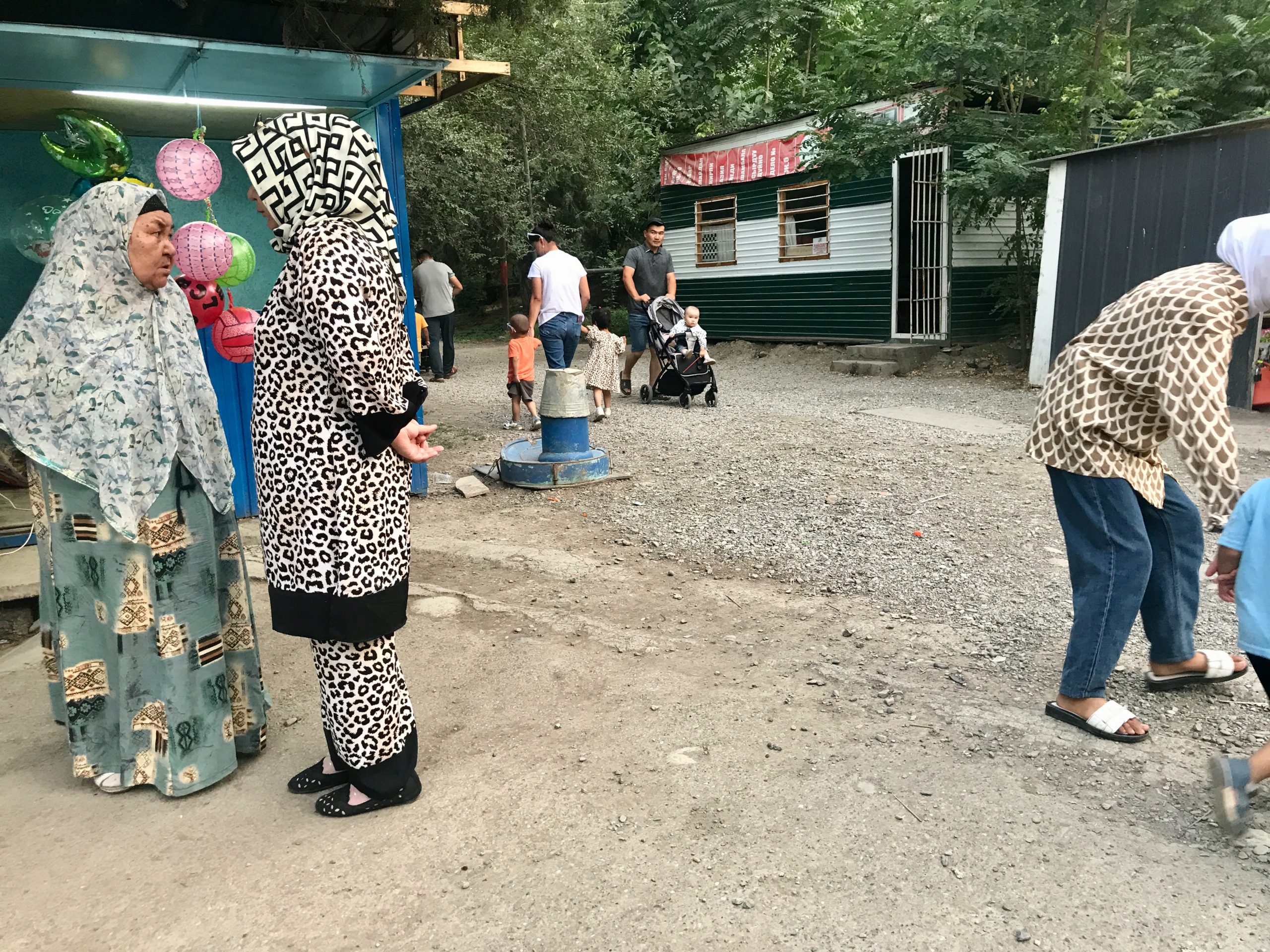 2
2
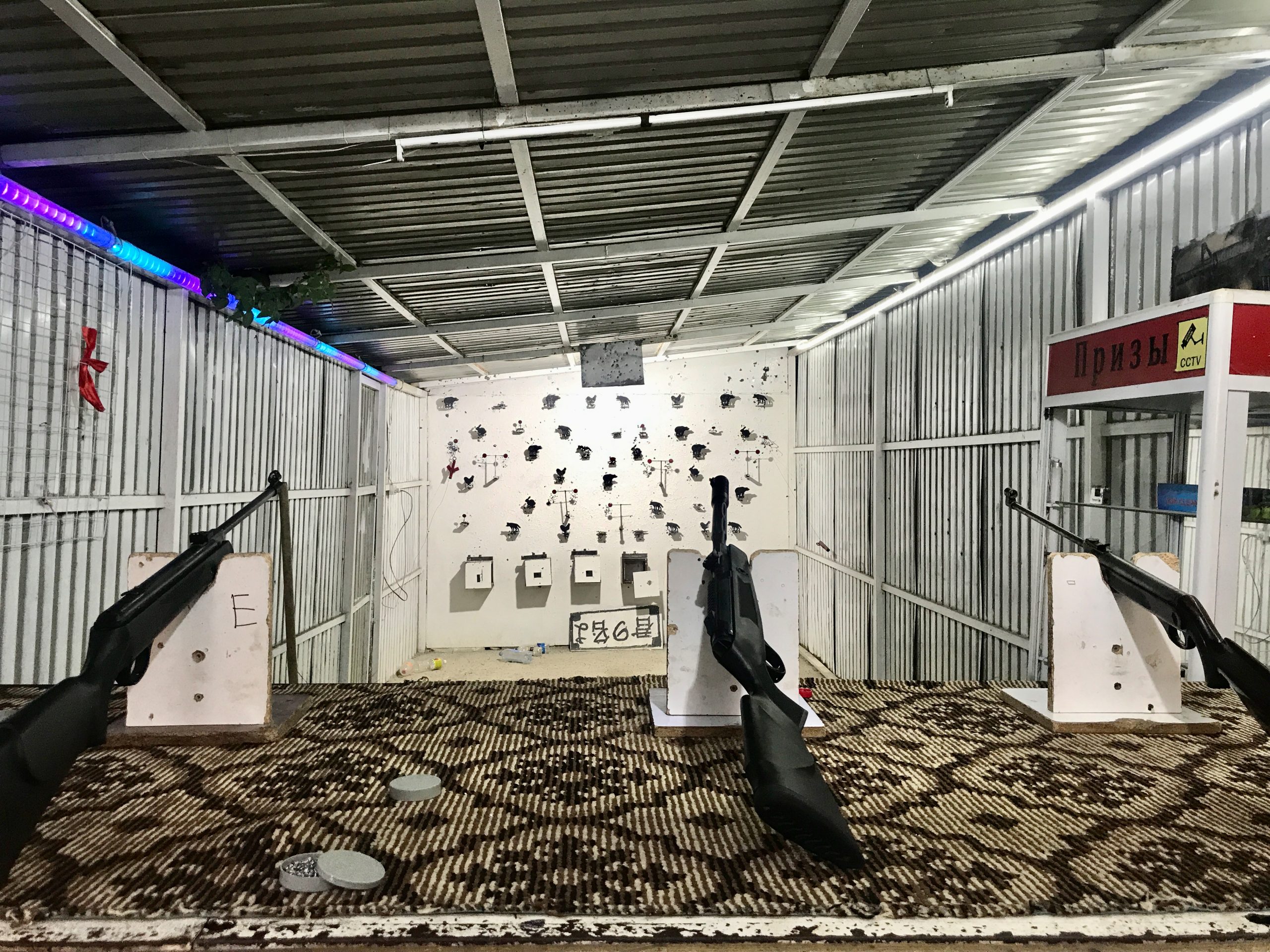 3
3
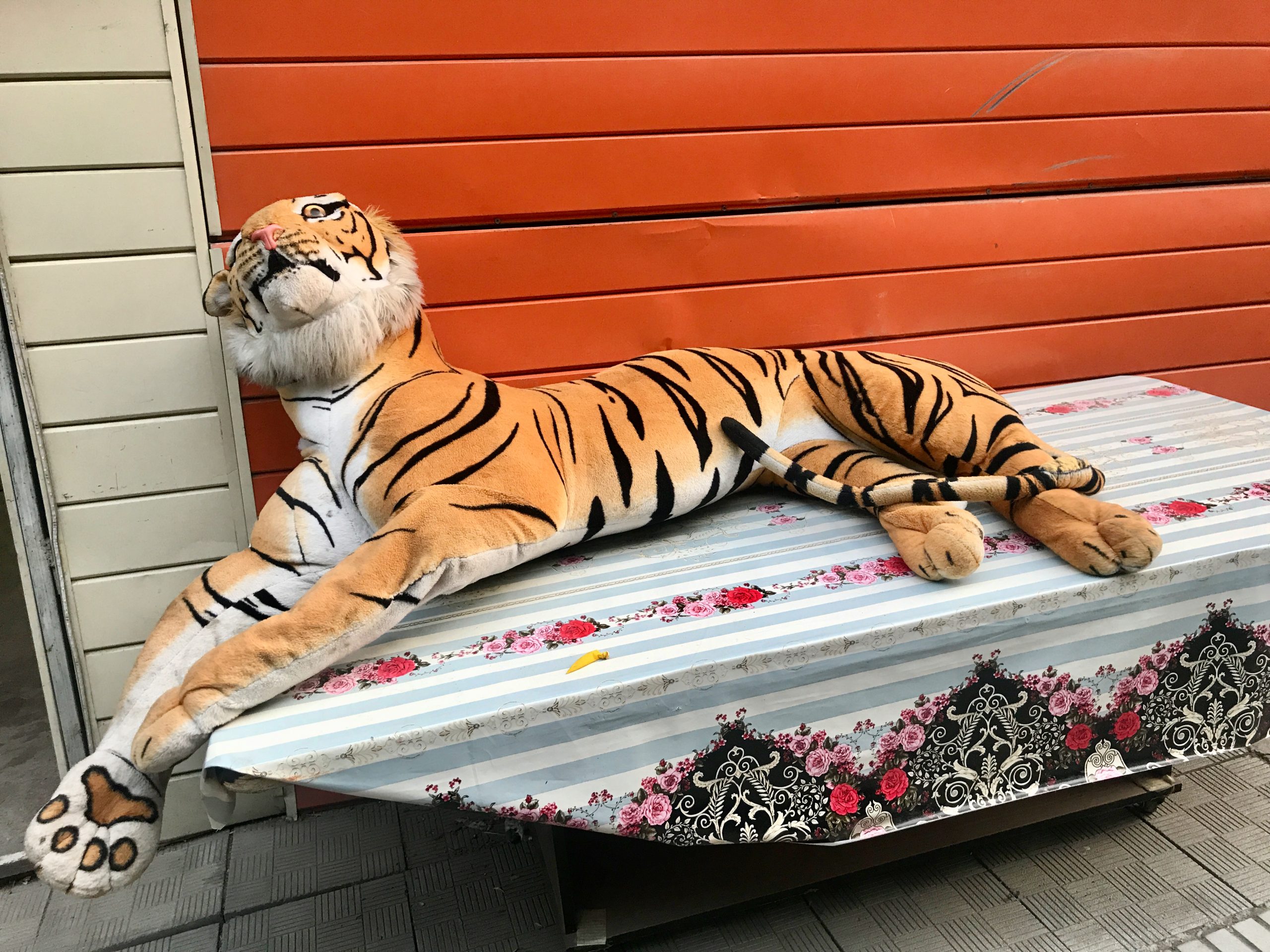 4
4
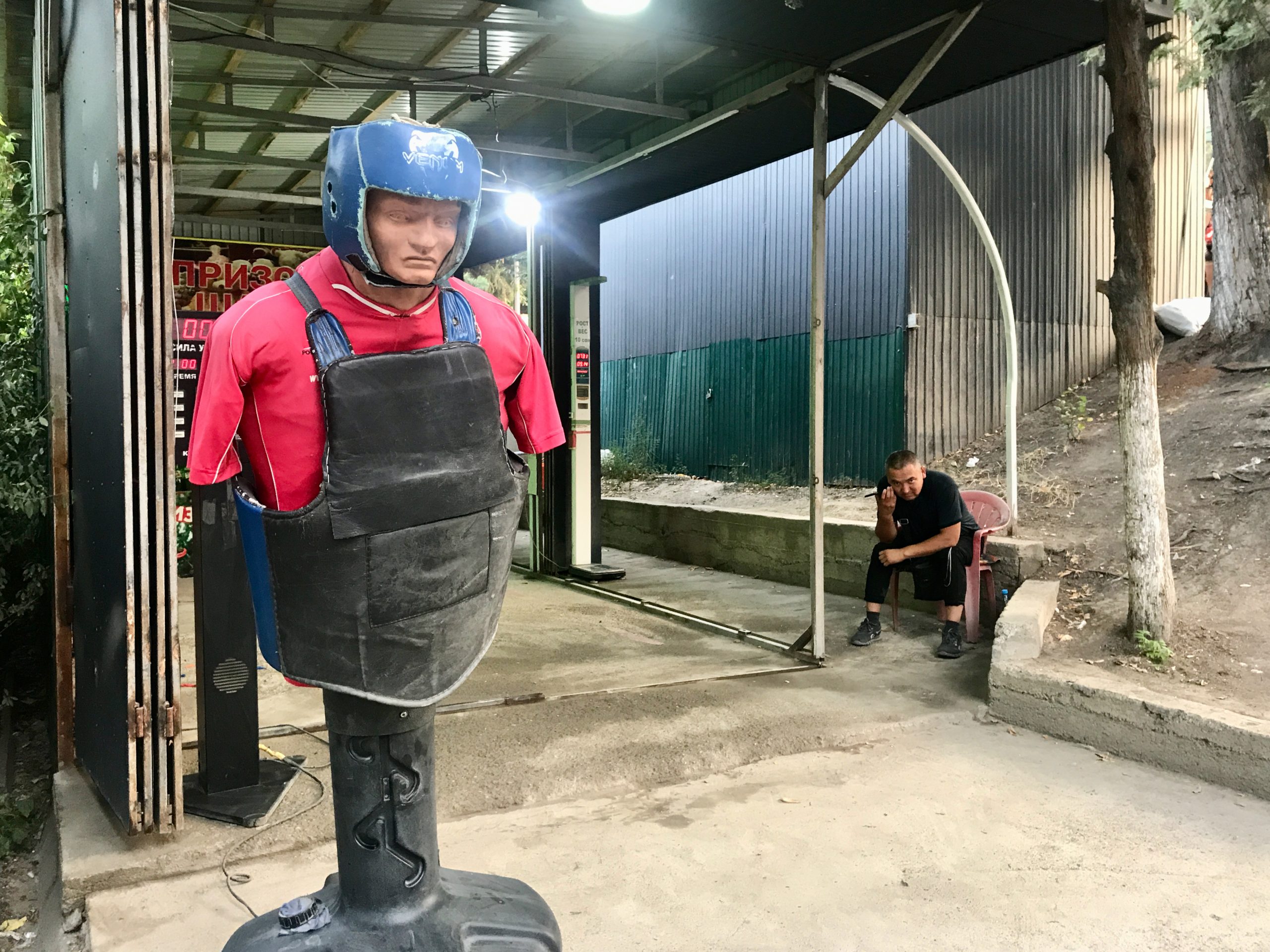 5
5
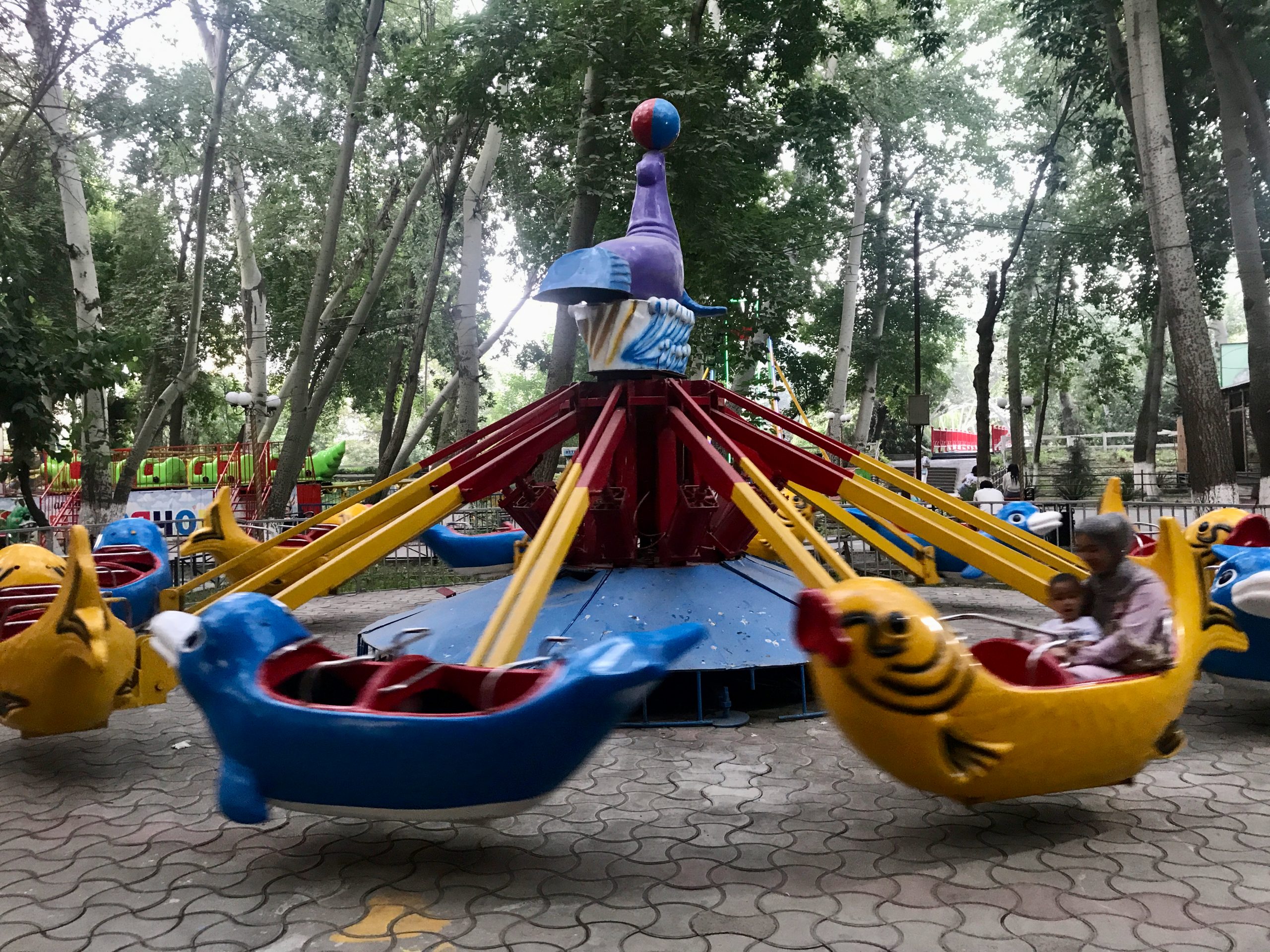 6
6
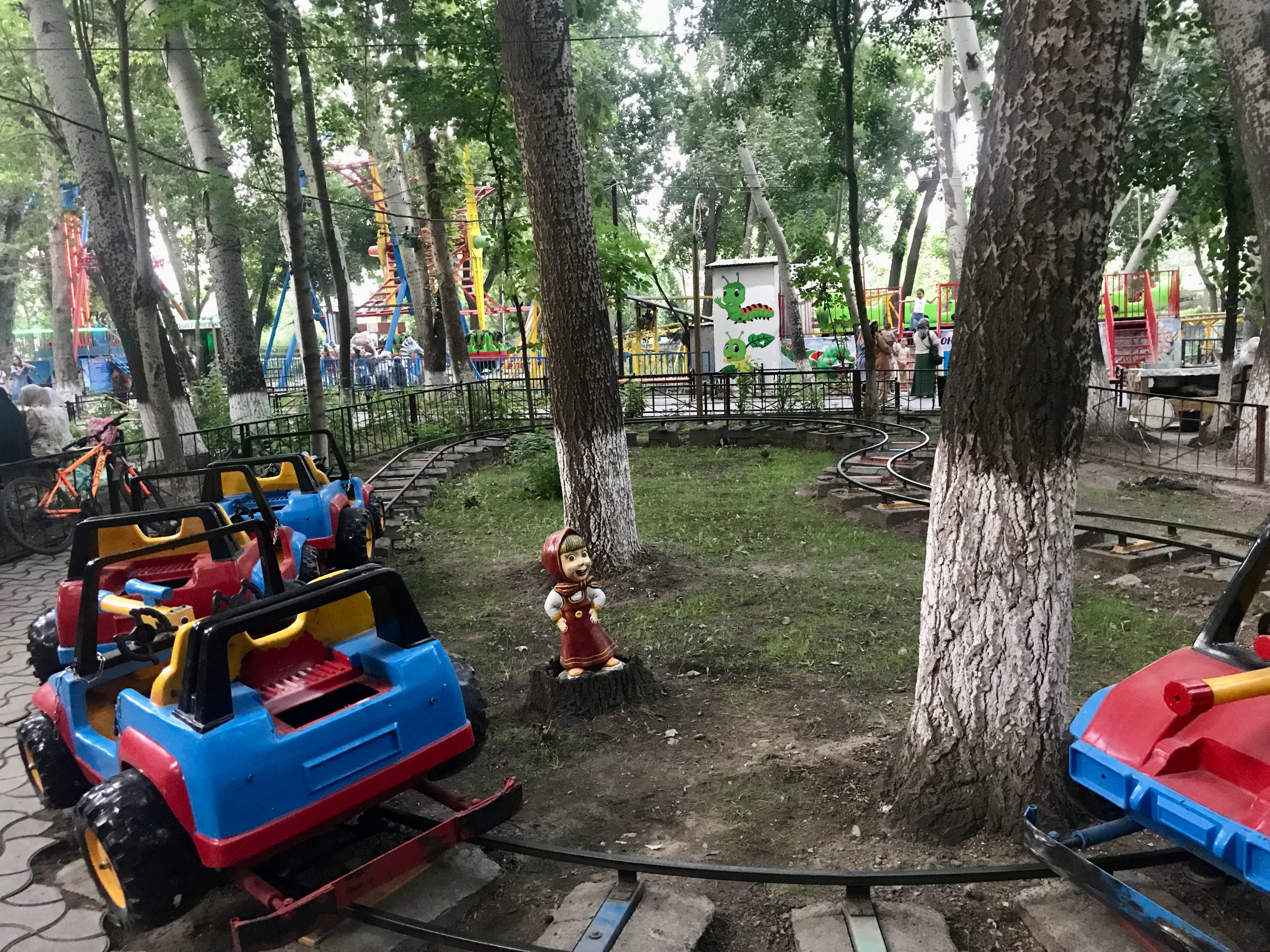 7
7
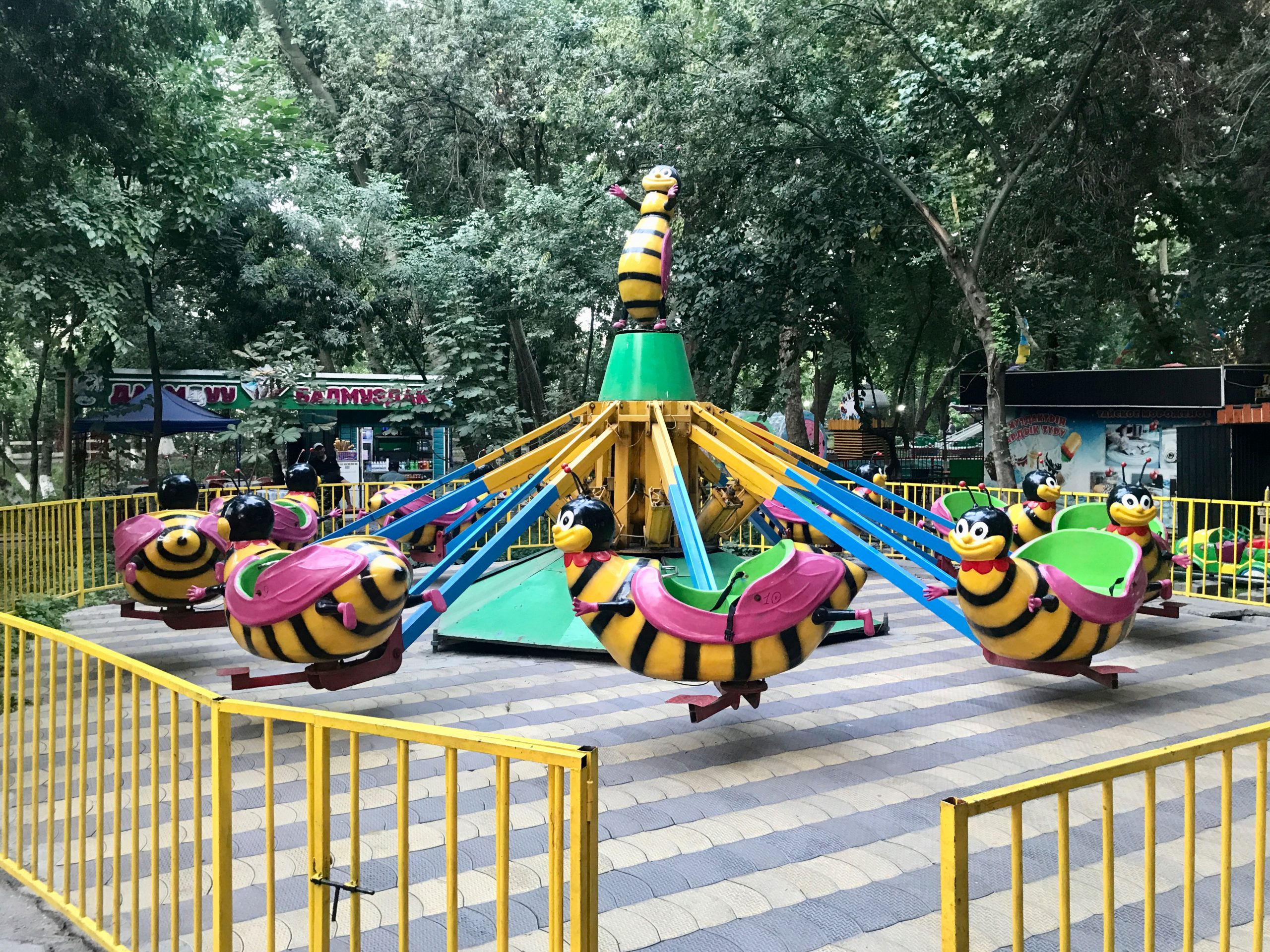 8
8
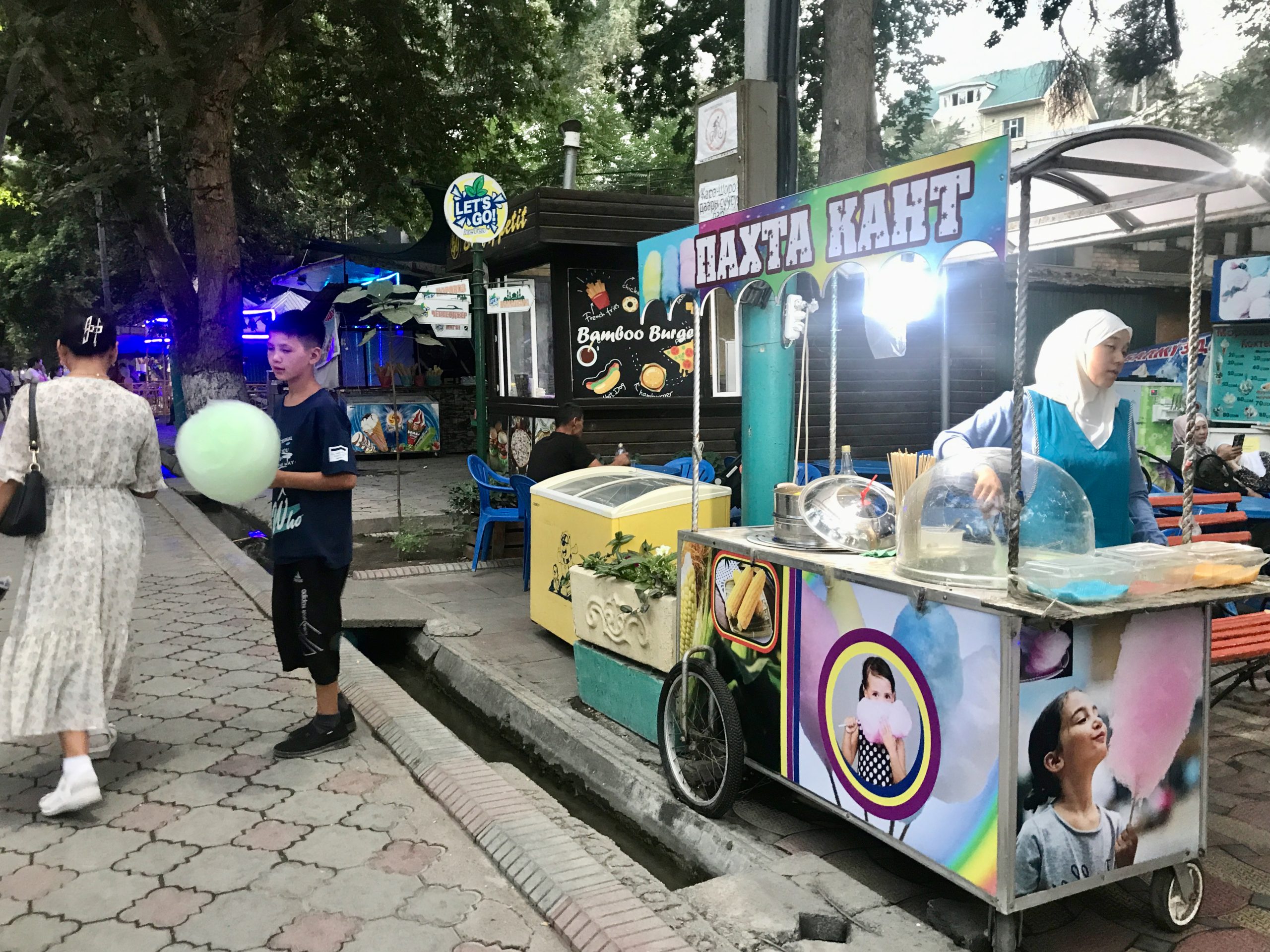 9
9
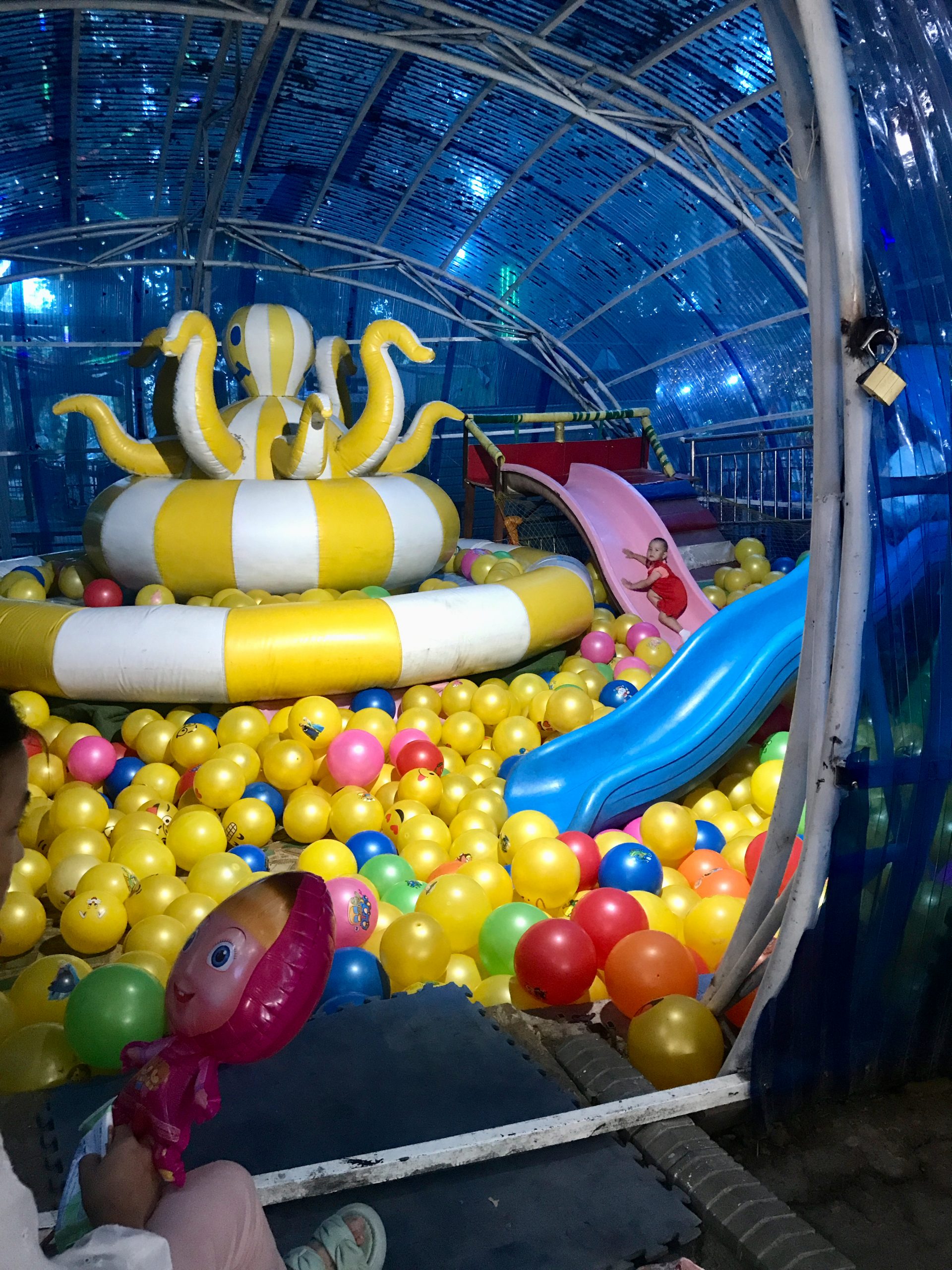 10
10
It was quite a bit busier, but I guess I tend to like photographing the lonelier moments.
I had a quiet time in Osh, but now I feel the urge to move on. I’m not really fit by any means health-wise, a diarrhoea has joined the mix, but as nice as my accommodation here is, I’m longing to see the southern Alai Mountains and time is a bit short….. I’m going to make myself a little more comfortable than I originally thought, though.
